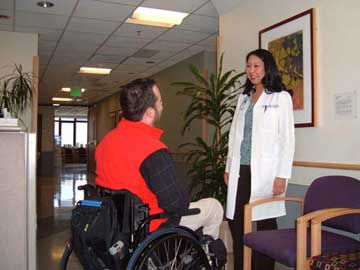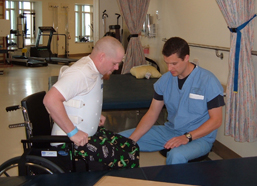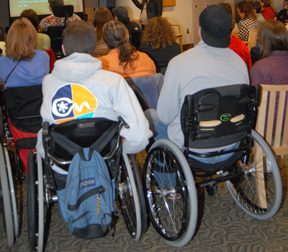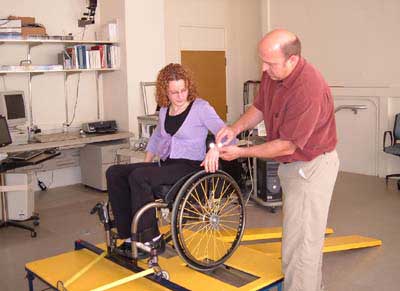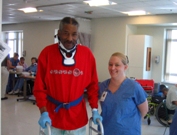Spinal Cord Injury Update
Summer 2009: Volume 18, Number 2
Aging with Spinal Cord Injury: Sleep Problems
By researchers at the University of Washington's Rehabilitation Research and Training Center on Aging with Disabilities
Contents
-
Sleep problems and aging with SCI
-
Physiological factors
-
Psychological factors
-
Behavioral/environmental factors
-
What is normal?
-
References
Sleep problems and aging with SCI
One of the first things that people notice as they grow older is a change in their sleep patterns. They often say they sleep less or don’t feel rested when they wake up. Adding a spinal cord injury into this equation can lead to more confusion about what exactly is causing the sleep problem in the first place and, perhaps more importantly, how to deal with it.
Fortunately, in recent years researchers have been focusing more on studying sleep problems in people with SCI. As a result, we are beginning to have a better understanding of these problems and what can be done about them.
Studies in the general population show that sleep problems increase as people age. One study found that 25% of people between the ages of 65 and 79 reported serious insomnia as compared to only 14% of people between 18 and 34. Common changes as people age include more awakenings during the night, more time spent in lighter sleep stages, less time spent in deeper sleep stages, and less total time spent asleep.
The problem seems to be worse in the SCI population. In a study completed by researchers at the University of Washington’s Rehabilitation Research and Training Center (RRTC) on Aging with Disabilities, people with SCI reported more overall sleep problems than both the general population and persons with other chronic illnesses.
Why should we be concerned about the quality and quantity of the sleep we get? While sleep problems can be annoying and lead to feeling sluggish and less energized throughout the day, some researchers have found that poor sleep can lead to serious health problems such as heart disease, diabetes and stroke.2, 3, 4
What can you do to improve sleep? Knowing the cause of your sleep problems is the first step in getting the right treatment.
Physiological factors
Many medical problems can disrupt sleep in persons with SCI, such as pain, spasticity and breathing problems (sleep apnea, for example), so treating these problems is an important first step in addressing sleep concerns. However, anyone with sleep problems should look closely at the following factors that can disrupt sleep:
Caffeine
People who drink caffeine are less likely to sleep well than those who do not, so avoid caffeine or limit it to the morning if you are having problems sleeping for any reason. Caffeine is present not only in coffee and black tea, but also in many sodas, so check labels.
Alcohol
Alcohol is a sedative. It may help you fall asleep, but it disrupts the sleep cycle and the quality of sleep, so you don’t get as restful sleep. Avoid alcohol altogether if you have sleep problems, or limit it to earlier in the evening rather than right before bed.
Sleeping pills
Like alcohol, many prescription drugs used for sleep can help you fall asleep, but they disrupt the sleeping cycle so you aren’t as rested. Many of these medications are also addictive, especially the benzodiazapines (such as Valium). Because of these problems, sedatives usually should not be taken for longer than two weeks and are not recommended as long-term solutions for sleeping problems. If you are taking a sedative for sleep, talk to your doctor about eliminating it. Getting off these medications must be done gradually and with medical supervision. Stopping abruptly can be dangerous.
Nicotine
Nicotine, whether smoked or chewed, is a stimulant and can contribute to sleep problems. (One more reason to quit!)
How to sleep better:
- Getting regular exercise and being aerobically fit can contribute to good sleep. However, people with sleep problems may want to limit exercise to the morning, since vigorous exercise late in the day may make it difficult for your body to start winding down for sleep. If you have sleeping problems and you aren’t already exercising, start an exercise program. If you use a manual wheelchair, talk to your health provider about how you can exercise safely (so you don’t over stress your shoulders, for example).
- Unlike sedatives, medications for depression can improve sleep and help you get back into a more normal sleep cycle.
Psychological factors
Anxiety, depression and ruminating (repetitive, worrying) thoughts at night can keep you from falling asleep or going back to sleep if you wake up. Antidepressant medication can be helpful, but cognitive-behavioral treatments such as counseling can be just as good, and both together are better than either one separately.
If anxious and ruminating thoughts are a problem at bedtime, spend five minutes sometime in the early evening well before bedtime to think about and write down the concerns that keep you up at night. If those thoughts return at night, you can tell yourself, “Oh, I have a plan to take care of that in the daytime. I won’t forget because I wrote it down.”
Behavioral/environmental factors
Many circumstances and behaviors can get in the way of falling asleep and getting a good night’s sleep. If you have trouble falling asleep, try these “good sleep hygiene” tips:
- Restrict the bedroom to sleep and intimacy. Don’t read, eat , watch TV, work or argue in bed.
- Turn the clock around so you can’t see it during the night.
- If you’re not asleep in 15-20 minutes, get out of bed and do something relaxing (like reading) until you get sleepy. Then go back to bed.
- Go to bed only when you are sleepy, otherwise you can lie in bed waiting to fall asleep, which can be upsetting and keep you awake longer.
- Try to get into a pattern of going to bed and especially getting up around the same time every day (even on weekends).
- Avoid naps, especially long naps (more than 30 minutes) later in the day.
- Establish a bedtime ritual that you do every night before bed, such as locking the doors, brushing teeth, reading for 10 minutes, or some other sequence of relaxing nighttime activities. This trains your mind to associate these behaviors with bedtime and to start drifting into “sleepy” mode.
What is normal?
People have different sleep requirements. Don’t get anxious about having to get eight hours of sleep. Some people need five, some need ten.
People also differ as to when the body needs sleep and when they get tired. Some people really are night owls. So if you can, let your body sleep when it wants. People often learn what their ideal sleep schedules are when they go on vacation (as long as it’s in the same time zone).
As people age, it is normal to have less efficient sleep, stay in bed longer, sleep less, be more restless and wake up more often. These changes are not necessarily something to be concerned about. However, if you’re feeling tired during the day, it’s a good idea to look at your sleep-related behaviors, make changes, and consult a health care provider if necessary. Adequate sleep is important to your health.
The contents of this article were developed under a grant from the Department of Education, NIDRR grant number H133B080024.
References
- Mellinger GD, Balter MB, Uhlenhuth EH. Insomnia and its treatment. Prevalence and correlates. Arch Gen Psychiatry. 1985 Mar;42(3):225-32.
- Al Lawati NM, Patel SR, Ayas NT. Epidemiology, risk factors, and consequences of obstructive sleep apnea and short sleep duration. Prog Cardiovasc Dis. 2009 Jan-Feb;51(4):285-93.
- Bradley TD, Floras JS. Obstructive sleep apnea and its cardiovascular consequences. Lancet. 2009 Jan 3;373(9657):82-93.
- King CR, Knutson KL, Rathouz PJ, Sidney S, Liu K, Lauderdale DS. Short sleep duration and incident coronary artery calcification. JAMA. 2008 Dec 24;300(24):2859-66.

